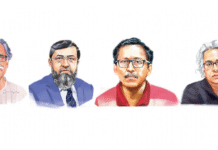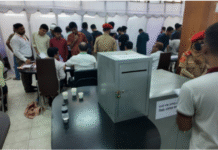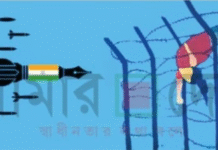M. Shahidul Islam
On a frigid Friday night last week when the Dhaka residents were about to retire into their slumbers, a white Toyota car screeched to a halt outside a high-walled, sprawling bungalow only yards away from an entrance to the Dhaka Cantonment.
The car jettisoned three VIP passengers, and the trio got whisked inside the living room of the fortress-looking compound. The guests were two senior political leaders from the main opposition party – BNP- and their courtship by a powerful spy master is meant to lure them away from their entrenched nationalist stronghold that BNP is, into a little known, newly formed political entity dubbed as the Bangladesh Nationalist Front (BNF).
Over the preceding months, the BNF has grown in size and facade from a mole hill to something like a diminutive mountain. Under the feisty, agile leadership of a renegade BNP leader named Barrister Nazmul Huda- who has fallen from the grace of the party leader Khaleda Zia for reasons that are best known to them alone – the party is growing more leafs and casting more shadows.
Among the leaders who joined Huda so far are BNP former cabinet ministers Jahanara Begum, a former Chittagong Mayor Aref Moinuddin, and a number of mid-ranking stalwarts. A little known editor of Moulana Bashani’s Haq Katha is learnt to be the lynchpin between the spy agency and Mr. Huda.
Most recruiting of BNP rebels and most of their deals were done inside the personal compound of a highly-placed intelligence officer of the country, and the game is a good old one of slicing and dicing the largest opposition party of the country as an archaic election strategy of the ruling AL to cling onto power by any means.
The top hierarchy of the government sources say, are pleased with the progress made so far by the spy agency to break the BNP’s backbone by luring electable rebels away and are claiming to have allotted a budget of Taka 120 crore to do so. The BNP is sticking to its threat not to participate and lend legitimacy to general election unless the caretaker system – designed in the now annulled statute as an interim poll-time- dispensation – is reinstated.
The prolonged incarceration of BNP’s acting secretary general, Mirza Alamgir, now released on bail, is suspected to be aimed at extracting from the otherwise dedicated and suave politician a commitment to join the polls under a differently-registered party composed of his loyalists in the BNP, if not from the newly found BNF.
Alamgir, his close associates say, did not relent to the pressure, the enticement, and the torture meted out to him while in captivity. Upon being released, he simply said, “The Government is trying to crush the opposition into smithereens.”
Similarly, there are muted acknowledgements from a number of Jamat leaders that offers were made to them to stand away from their captive leaders being tried for alleged war crimes in return for allowing the new leadership a free hand to conduct politics and bag a substantial number of seats in the next parliament.
One Jamat leader went about saying that the life imprisonment of the Jamat leader Abdul Quader Mollah, instead of death by hanging, was made possible as a bait of higher sentence and possible rehabilitation, if Jamat leaders not to ally with the BNP in the next election, or after. The leader requested not to be named.
One of the main flaws in such a game plan of the government is not that the tactic may not work, but that the prescription seems to be offering wrong medicine for a disease that is much more structural than what meets the eye. There may not be an election even if the situation continues to deteriorate. If there is one, it may not concur with the algorithm being devised by the government.
This is because, notwithstanding the Awami League-leftist coalition-making during the 2008 election to form a government, the nationalist-Islamist compact of the BNP-Jamat denominations has undergone change of balance since.
The constitution of the war crime tribunals in 2010, and the arrest and the indictment of most of the senior Jamat leaders have changed the Islamist polity’s sense of direction broadening its ideological base. The BNP has also moderated itself phenomenally following the lessons learnt from the 2007 military intervention in politics.
Taking cues from the conducive external political ambiance stirred by the US’s support for the moderate Islamists in the Mid-East and the AL-led government’s increased estrangement with the USA and its allies, the Jamat managed to capitalize strongly on a war crime trial that has proven to be biased, influenced, and, statutorily and procedurally flawed.
The intransigence of the government in rectifying these pitfalls made the cry of the Islamists for justice more appealing to audiences within and without. These ground realities have been reinforced further by some other factors that are pushing the nationalist forces – belonging mainly to the BNP and the Jatio Party – to the brink.
Like in many other Muslim-predominant nations, Bangladesh politics too has now embraced, willingly or not, the vivid distinctiveness of a bipolarity seen only among the secularists and the Islamists of the Mid-East nations. The battle line is drawn, and, it can only be transgressed with great peril. Under these circumstances, the crooked attempts to divide the BNP, and playing proxy with the JP under H.M Ershad, is not a stratagem that can hold waters. As matters stand in the political merry-go-round, Bangladesh appears headed for another rough ride over what seems like an irreconcilable extra-constitutional bump.
Source: Holiday









